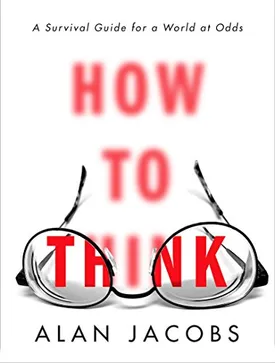How to Think: A Survival Guide for a World at Odds by Alan Jacobs
We’re living in a world of rapidly increasing polarization of ideas, values, and beliefs. In How to Think: A Survival Guide for a World at Odds, renowned author and professor Alan Jacobs offers valuable insights and advice on how to think more deeply and thoughtfully in the chaos of a divided society.
Jacobs' analysis begins by reviewing recent political and social divisions between two dominant groups: those on the left, who have traditionally embraced progressive principles such as globalism, and those on the right, who have traditionally favoured traditional values and principles. He urges readers to be open-minded and seek out ideas from both sides, arguing that both sides offer valuable perspectives and knowledge.
From there, he moves onto less related topics such as the public’s faith in experts, the importance of truth-seeking, and the power of stories. The key theme throughout the book is the importance of creating space for true dialogue and learning from one another. He encourages readers to develop the skills needed to listen for the underlying emotions and thought processes behind an argument and to strive to understand how others come to their own conclusions.
Jacobs argues that the current state of thoughtlessness, in which people form opinions without engaging in enough critical thinking, is a great danger to the progress of society. He stresses the need for readers to be more mindful when forming their beliefs, pushing them to consider the consequences of any opinion they might express. He sprinkles helpful tips throughout the book to help readers process external information without letting their personal beliefs colour it.
In addition, Jacobs examines the role of technology and social media in forming beliefs and sparking disagreements. By placing less emphasis on relying on technology for opinions, readers can become more self-aware and able to hold sharper opinions about the world around them. He talks about the need to reduce digital noise and create more space for face-to-face conversations, as well as the dangers of creating confirmation bias from social media algorithms.
Overall, How to Think provides readers with a deep dive into the types of thought processes needed to gain a better understanding of the world around us and create a healthier society. Jacobs delivers helpful insights and advice on how to be a better thinker and apply critical thinking skills in the face of disagreement and uncertainty. Through a combination of thoughtful analysis and easy-to-grasp examples, Jacobs creates a valuable guide that can help readers navigate a divided world more peacefully.

